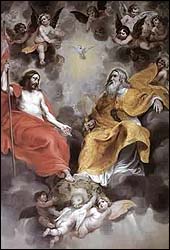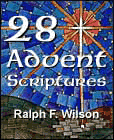
|
Old Testament
New Testament
Gospels
Acts
Paul's Letters
General Letters
Revelation
Topical Studies
Beginning the Journey (for new Christians). en Español

|
Old Testament
New Testament
Gospels
Acts
Paul's Letters
General Letters
Revelation
Topical Studies

|
Home
Bible Studies
Articles
Books
Podcasts
Search
Menu
Donate
About Us
Contact Us
FAQ
Sitemap
Day 18. Image of the Invisible God (Colossians 1:15-20)
Wednesday, Third Week of Advent
 Hendrick van Balen, Holy Trinity (1620s), Saint Jacobskerk Antwerp. Son and Father co-reigning with dove above. |
Read in your Bible Colossians 1:15-20
There's a popular Christmas song that I really like:
"Mary did you know that your baby boy would
one day walk on water? ...
Is the Lord of all creation? ...
Is the Great I AM?"119
Mary looks into the face of her newborn. What does she see? She also has heard the angels' announcements and prophecies regarding this little boy that he is the promised Messiah. But it is nearly impossible to really grasp who Jesus Christ is in all his fulness. Paul's Letter to the Colossians gives us a glimpse. Our passage contains two parts. First, seven different cameos that highlight various aspects of Christ's supremacy (verses 15-18) and second, an explanation of how God fulfills his purpose through Christ (verses 19-20).
Cameo 1. Image of the Invisible God (Colossians 1:15a)
"He is the image of the invisible God...." (Colossians 1:15a)
We're given two contrasting concepts: image and invisibility. An image is something you can see. Invisibility, by definition, describes what you can't see.120 The great glory of Judaism was its belief in the one God who could not be seen -- the only God! Jesus declares, "God is Spirit" (John 4:24).
"God's invisible qualities -- his eternal power and divine nature...." (Romans 1:20)
"Now to the King eternal, immortal, invisible, the only God...." (1 Timothy 1:17)
"[Moses] persevered because he saw him who is invisible." (Hebrews 11:27)
The amazing truth of Christianity is that the invisible God has allowed himself to be seen in Jesus of Nazareth.121
Cameo 2. Firstborn Over All Creation (Colossians 1:15b-16)
"15 He is ... the firstborn over
all creation.
16 For by him all things were created:
things in heaven and on earth,
visible and invisible,
whether thrones or powers or rulers or authorities;
all things were created by him and for him." (Colossians 1:15b-16)
This verse uses the Near Eastern concept of "firstborn" referring to the special status accorded the firstborn son.122 "Firstborn over all creation" here doesn't mean that Jesus is the first created being, but that he is preeminent over all created beings.123
Jesus is "the firstborn over all creation," the sum total of everything created.124 But the author isn't talking about the fauna and flora of the earth so much as sentient beings, both human beings and spiritual beings. Angels and archangels, even Satan, the fallen angel, and his demons, once angels themselves, are created by him. And he vanquishes them!
This passage ends with the words, "All things were created by him and for him" (Colossians 1:16e). Jesus is not just one among various spiritual authorities. He is the Creator of them all and they exist to serve him.
Cameo 3. Before All Things (Colossians 1:17a)
"He is before125 all things...." (Colossians 1:17)
This passage teaches the pre-existence of Christ. He is not just a human, nor a created being himself. He predates everything.126
Cameo 4. In Him All Things Hold Together (Colossians 1:17b)
"... In him all things hold together."127 (Colossians 1:17)
Jesus is not just the clockmaker who creates the timepiece and sets it in motion and then leaves. He is one who continually sustains it and holds it together, despite all the forces -- both subatomic and macro -- that might blow it apart.
Cameo 5. Head of the Body, the Church (Colossians 1:18a)
"And he is the head128 of the body, the church...." (Colossians 1:18a)
The emphasis here is on Christ's vital connection to and authority over the Church. We are Christ's body here on earth and serve under his direction. The point is that Christ not only has priority over the principalities and powers, he is the supreme Head of the Church itself.
Cameo 6. The Beginning (Colossians 1:18b)
In addition to the concept of Christ's preexistence ("he is before all things"), Paul emphasizes Christ as "the beginning."
"He is the beginning129
and the firstborn from among the dead,
so that in everything he might have the supremacy." (Colossians 1:18)
Christ is the Beginning and the End (Revelation 22:13; cf. 21:6)
Cameo 7. Firstborn from Among the Dead (Colossians 1:18c)
"He is ... the firstborn from among the dead." (Colossians 1:18c)
In verse 15b, "firstborn" was used in the sense of primacy due to birth order. Here, the idea of birth order itself is in view. Jesus is "firstborn from among the dead" here and in Revelation 1:5 in the sense that he is the first to be resurrected from the dead. His resurrection from the dead encourages us that we, too, will be raised at his coming. He is our hope (John 11:25-26; Acts 26:22-23; 1 Corinthians 15:20).
Preeminence and the Fulness of God (Colossians 1:18d)
Christ's 7-fold distinctives outlined in this passage culminate with a purpose clause:
"... So that in everything he might have the supremacy.130 For God was pleased to have all his fullness131 dwell132 in him." (Colossians 1:18d-19)
Christ holds the highest rank of all-- above any person or any spiritual power, in all creation. Jesus isn't given these distinctives to make him preeminent. Rather, these distinctives demonstrate his preeminence. He is in first place. And in him all God's presence -- fullness, completeness -- dwells.
Reconcile All Things to God (Colossians 1:20a)
Finally, we see the purpose of Christ's coming to earth -- and it involves the cross.
"For God was pleased133 ... through him to reconcile134 to himself all things, whether things on earth or things in heaven, by making peace through his blood, shed on the cross." (Colossians 1:20b)
Reconciliation means to end the state of conflict and enmity between parties and in its place reinstitute peace and friendship. God seeks to reconcile, "all things, whether things on earth or things in heaven." 135 We see this restated in Ephesians,
"... To bring all things in heaven and on earth
together under one head, even
Christ." (Ephesians 1:10)
 Also available in book formats: PDF, Kindle, and paperback. |
Mary, did you know that this Baby of Bethlehem is destined to reconcile all of creation to God in his own body on the cross? That this Baby is God incarnate, "the image of the invisible God"? If you ever wonder if Christmas is about family time, a big meal, and the exchange of gifts, you've grossly underestimated its purpose. God's purpose in Christmas is to begin his mission to draw all mankind to himself through Christ. That's what this Baby is about.
Prayer
Thank you, invisible Father, for sending your Son as a human baby with a destiny to bring us to you. Thank you that he was willing to lay aside his preeminence and humble himself, even to death, that he might save us. Thank you! In Jesus' holy name, we pray. Amen.
Discussion Question
Q18. (Colossians 1:15-20) Which of Christ's qualities of
preeminence and greatness is especially meaningful to you? What does it
mean for Jesus to humble himself (Philippians 2:7-8). Why is the incarnation
such a miracle?
https://www.joyfulheart.com/forums/topic/2092-q18-preeminence/
Endnotes
[119] Mark Alan Lowry (1984); lyrics; Lee Rufus Greene, music; © Greensleeves Publishing Limited, Rufus Music, Word Music.
[120] "Invisible" is aoratos, " pertaining to not being subject to being seen, unseen, invisible," from a-, "not" + oraō, "to see" (BDAG 94).
[121] The word "image" is eikōn, "an object shaped to resemble the form or appearance of something, 'likeness, portrait,' then figuratively, by extension, "that which has the same form as something else (not a crafted object), 'living image'" (BDAG 283, 2).
[122] Prōtotokos, BDAG 894, 2a.
[123] Cf. Exodus 4:22; Psalms 89:27.
[124] Verse 16 uses the verb "create," ktizō, "to bring something into existence, create" (BDAG 572).
[125] The Greek word "before" is pro, a "marker of a point of time prior to another point of time, earlier than, before" (BDAG 864, 2).
[126] See John 1:1-3; 8:58; John 17:5; Revelation 4:8.
[127] "Hold together" (NIV, NRSV), "consist" (KJV) is synistēmi, originally, "to bring together by gathering, unite, collect." As an intransitive verb it is sometimes used as "to be composed or compounded of various parts, consist" (as in the KJV), but also, "to come to be in a condition of coherence, continue, endure, exist, hold together" (BDAG 973, B3). See 2 Peter 3:5; Psalms 75:3; Hebrews 1:3a.
[128] "Head" is kephalē. It means first, the physical head, particularly in the head-body analogy. But then extends to a figurative use as "being of high status, head." With living beings, kephalē refers to superior rank (BDAG 541-542).
[129] "Beginning" is archē. The basic idea of the word, however, is not "ruler" (as in verse 16), but "the commencement of something as an action, process, or state of being, beginning, that is, a point of time at the beginning of a duration." Here, in context with "firstborn," Paul is speaking figuratively of a person, "one with whom a process begins, beginning" (BDAG 137, 2). The idea of ruler or authority, which we saw in Colossians 1:16b above as "rulers" (NIV) or "principalities" (KJV), derives from the concept of one who begins or initiates.
[130] "Supremacy" (NIV), "supreme" (NJB), "first place" (NRSV, NASB), "preeminence" (KJV) is prōteuō, "to hold the highest rank in a group, be first, have first place" (BDAG 892).
[131] "Fullness" is plērōma, "that which is brought to fullness or completion," here, "sum total, fullness," even "(super)abundance" (BDAG 828, 3b). The word is used in second century Gnostic writings as a religious technical term, but here in Colossians it affirms that in Jesus, God is fully present and that Jesus is fully divine (Colossians 2:9-10; Ephesians 3:19; 4:13).
[132] "Dwell" is katoikeō," to live in a locality for any length of time, live, dwell, reside, settle (down)" (BDAG 534, 1b).
[133] "Pleased" is eudokeō, "to consider something as good and therefore worthy of choice, consent, determine, resolve" (BDAG 404, 1).
[134] "Reconcile" is apokatallassō. This compound Greek word in verses 20 and 21 is found only in Christian writings. It is formed from apo-, "finishing and completion" + katallassō, "the exchange of hostility for a friendly relationship, reconcile" -- "to reconcile completely" (Thayer, p. 63; BDAG 112).
[135] Does it refer also to evil spiritual forces -- the principalities and powers, for example? Perhaps some of them, though Revelation tells us that the ultimate destiny of Satan, the Antichrist, and the false prophet is the lake of fire (Revelation 20:10).
Copyright © 2026, Ralph F. Wilson. <pastor![]() joyfulheart.com> All rights reserved. A single copy of this article is free. Do not put this on a website. See legal, copyright, and reprint information.
joyfulheart.com> All rights reserved. A single copy of this article is free. Do not put this on a website. See legal, copyright, and reprint information.

